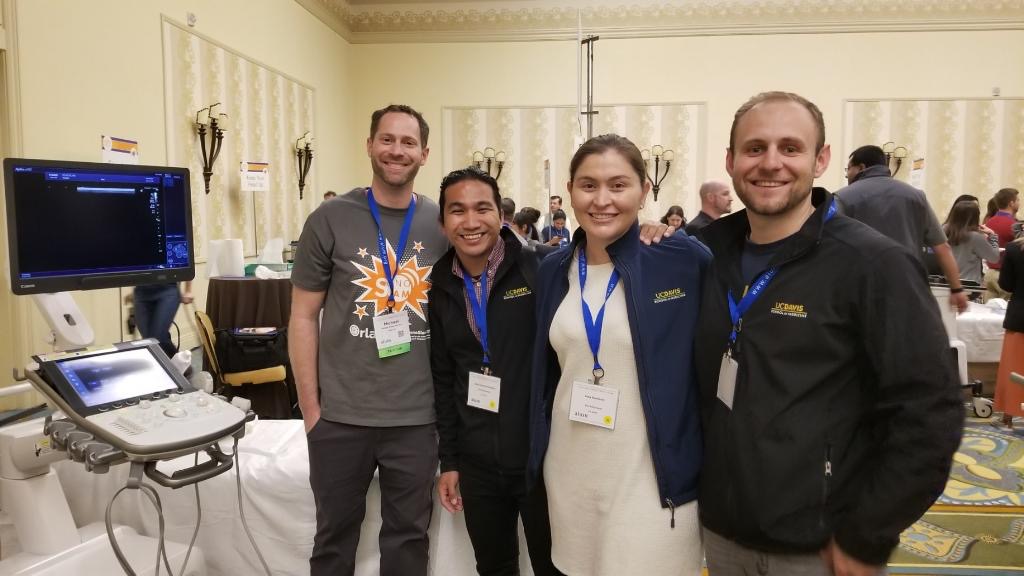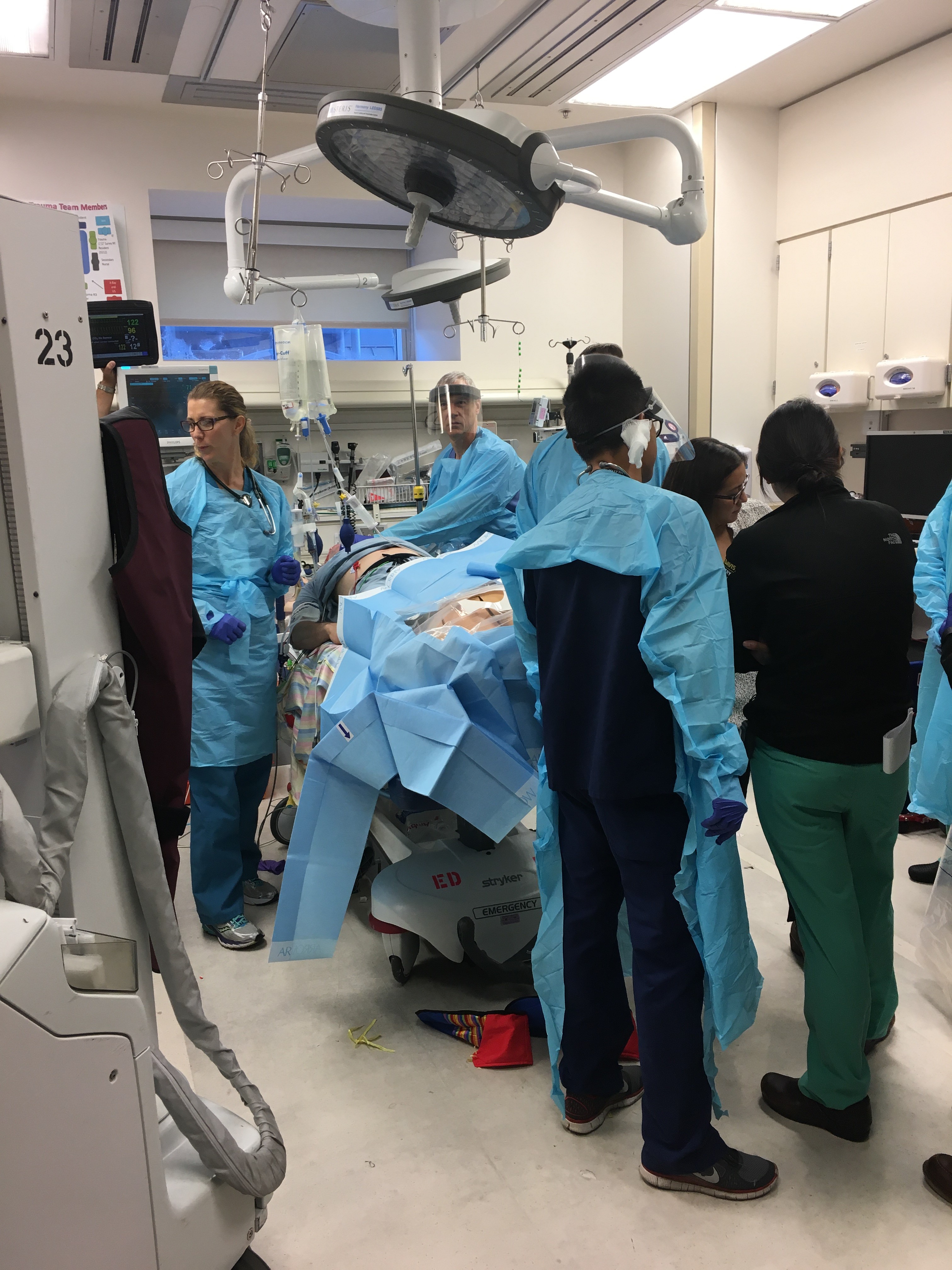Medical Student Course Offerings
Click a course name below to learn more about our medical student curriculum.
This preceptorship is offered to first and second year UC Davis medical students seeking exposure to clinical medicine. It is particularly well suited for students that are interested in emergency care and are considering a career in emergency medicine. Students spend two clinical shifts in the emergency department with an Emergency Medicine Faculty member. The student has the opportunity to see a wide spectrum of patients, many of which are critically ill or injured. Grading: Pass/Fail only.
This course offers in depth review of clinical and medical toxicologic emergencies. The rotation includes contact with toxicology trained emergency faculty, didactic lectures, journal club, simulation training and exposure to a very busy poison control center. Grading: Pass/Fail only.
The primary goal of the emergency medicine clerkship is to teach the student how to recognize and manage acute life threatening conditions. A secondary goal is to develop the diagnostic skills necessary to evaluate patients with common symptoms such as chest pain or abdominal pain.
Students should have a solid foundation in internal medicine, surgery, and pediatrics prior to starting this rotation. The student will be expected to take a focused history and physical and present it in a concise, clear fashion. Grading: Honors/Pass/Fail determined by faculty evaluations.
For more on course curriculum
There is an increasing role for Point of Care Ultrasound across many specialties. This tool provides an extension to the assessment of the critically ill patient and affords dynamic guidance of invasive procedures. The elective will focus on image acquisition and interpretation at the bedside within the ED under the supervision of the emergency ultrasound fellow and ED attendings. Image and tape review during weekly Emergency Ultrasound Continuous Quality Improvement will provide a forum for focused learning and direct feedback on cases. Prerequisites: 4th year med student in good standing. EMR 440 (or equivalent) recommended prior to rotation. Grading: Pass/Fail only.
Quarter: Part A Spring/Fall, Part B Winter/Spring
Contact: Student Coordinator

6 units of CLINICAL DIDACTIC credit and 6 units of ADVANCED CLERKSHIP credit
A longitudinal ultrasound independent study course that is available to medical students who want to gain expertise in the area of point-of-care ultrasound. The elective combines clinical time spent scanning patients, didactics which can be completed at the student's own pace, and a scholarly project. The course provides students a multitude of opportunities to scan live patients, review and interpret images with experts, one-on-one teaching time with instructors, and to teach their peer groups. In the past, students have taught multiple sessions within the school of medicine curriculum, presented at the UC Davis Pre-clinical Conference, and presented projects at regional conferences. Students can expect to complete 100-200 ultrasound exams and develop an ultrasound portfolio, gain competence in core point-of-care sonographic techniques, and develop expertise in teaching ultrasound. The course is designed for those who plan to use this critical diagnostic tool heavily in their future careers and enrollment is limited. Interested students are encouraged to contact the IOR early with a letter of intent. Prerequisite: completion of third year rotations. Grading is Pass/Fail only.
Students will see patients in the Pediatric area of the Emergency Department under the supervision of an Emergency Medicine Attending. Emphasis on recognition and management of the acutely ill pediatric patient and treatment of common pediatric complaints. Prerequisites: satisfactory completion of Medicine, Surgery and Pediatrics. Grading: Honors/Pass/Fail determined by faculty evaluations.
The paradigm of healthcare delivery in the US is changing rapidly. To prepare the next generation of physician leaders, this course will provide students with the skills, tools, and knowledge needed to impact decisions made at the policy level. In this course, students will learn about the government's role in society, social and economic forces guiding policy decisions, and concepts and methods applied in health policy analysis. Next, students will learn effective methods of translating key research and public health findings into language policymakers can understand. Throughout the course, students will apply this knowledge by reviewing salient historical and current health-related legislative initiatives and analyze their outcomes. Learn more about course EMR 480

Simulator-based skills training for emergency procedures. Topics include airway management, central venous access, chest tube placement, and general critical care resuscitation skills. Prerequisites: 4th year medical student in good standing. Current BLS (basic life support) certification. Grading: Pass/Fail only.
Emergency Medicine research is scientific investigation to develop new knowledge in emergency situations to improve the care of prehospital and Emergency Department care. This research spans the entire spectrum of research including basic science, translational, clinical, and outcomes, as well as Emergency Medicine teaching and education. Learn more about course EMR 499
All visiting students are encouraged to visit the UC Davis Office of the Registrar's website for information about rotating with Emergency Medicine.
- Visiting Underrepresented Scholar Program Application Form
- Visiting Underrepresented Scholar Program Description

